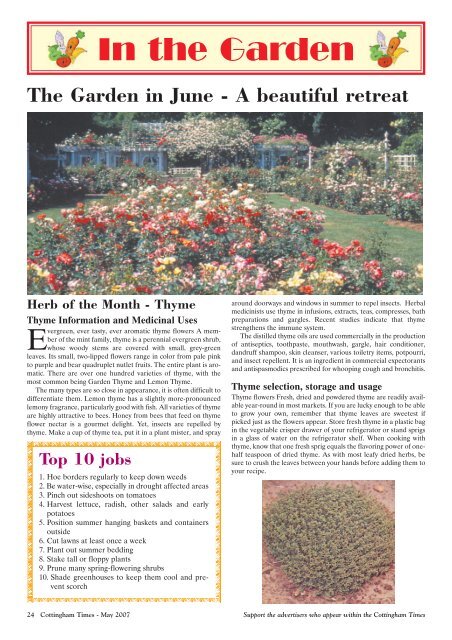Download Here... - The Cottingham Times
Download Here... - The Cottingham Times
Download Here... - The Cottingham Times
You also want an ePaper? Increase the reach of your titles
YUMPU automatically turns print PDFs into web optimized ePapers that Google loves.
In the Garden<br />
<strong>The</strong> Garden in June - A beautiful retreat<br />
Herb of the Month - Thyme<br />
Thyme Information and Medicinal Uses<br />
Evergreen, ever tasty, ever aromatic thyme flowers A member<br />
of the mint family, thyme is a perennial evergreen shrub,<br />
whose woody stems are covered with small, grey-green<br />
leaves. Its small, two-lipped flowers range in color from pale pink<br />
to purple and bear quadruplet nutlet fruits. <strong>The</strong> entire plant is aromatic.<br />
<strong>The</strong>re are over one hundred varieties of thyme, with the<br />
most common being Garden Thyme and Lemon Thyme.<br />
<strong>The</strong> many types are so close in appearance, it is often difficult to<br />
differentiate them. Lemon thyme has a slightly more-pronounced<br />
lemony fragrance, particularly good with fish. All varieties of thyme<br />
are highly attractive to bees. Honey from bees that feed on thyme<br />
flower nectar is a gourmet delight. Yet, insects are repelled by<br />
thyme. Make a cup of thyme tea, put it in a plant mister, and spray<br />
Top 10 jobs<br />
1. Hoe borders regularly to keep down weeds<br />
2. Be water-wise, especially in drought affected areas<br />
3. Pinch out sideshoots on tomatoes<br />
4. Harvest lettuce, radish, other salads and early<br />
potatoes<br />
5. Position summer hanging baskets and containers<br />
outside<br />
6. Cut lawns at least once a week<br />
7. Plant out summer bedding<br />
8. Stake tall or floppy plants<br />
9. Prune many spring-flowering shrubs<br />
10. Shade greenhouses to keep them cool and prevent<br />
scorch<br />
around doorways and windows in summer to repel insects. Herbal<br />
medicinists use thyme in infusions, extracts, teas, compresses, bath<br />
preparations and gargles. Recent studies indicate that thyme<br />
strengthens the immune system.<br />
<strong>The</strong> distilled thyme oils are used commercially in the production<br />
of antiseptics, toothpaste, mouthwash, gargle, hair conditioner,<br />
dandruff shampoo, skin cleanser, various toiletry items, potpourri,<br />
and insect repellent. It is an ingredient in commercial expectorants<br />
and antispasmodics prescribed for whooping cough and bronchitis.<br />
Thyme selection, storage and usage<br />
Thyme flowers Fresh, dried and powdered thyme are readily available<br />
year-round in most markets. If you are lucky enough to be able<br />
to grow your own, remember that thyme leaves are sweetest if<br />
picked just as the flowers appear. Store fresh thyme in a plastic bag<br />
in the vegetable crisper drawer of your refrigerator or stand sprigs<br />
in a glass of water on the refrigerator shelf. When cooking with<br />
thyme, know that one fresh sprig equals the flavoring power of onehalf<br />
teaspoon of dried thyme. As with most leafy dried herbs, be<br />
sure to crush the leaves between your hands before adding them to<br />
your recipe.<br />
24 <strong>Cottingham</strong> <strong>Times</strong> - May 2007 Support the advertisers who appear within the <strong>Cottingham</strong> <strong>Times</strong>



